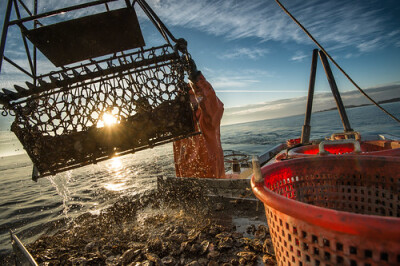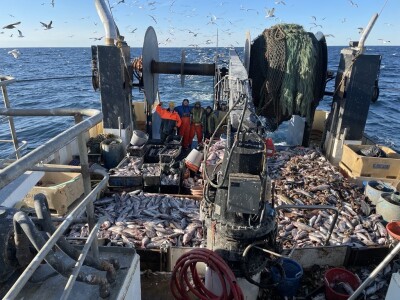Seafood: keep it real
In a blow to the aspirations of open-ocean fish farmers, the Department of Agriculture's National Organic Standards Board Livestock Committee in March recommended that fish raised in open net-cages and those using wild caught fish in their diet be excluded from forthcoming organic aquaculture standards.
We agree. In fact, we more than agree, because we believe non-carnivorous fish farmed in closed systems should be excluded as well.
It is likely that concerns about waste, escapement and sea lice in seagoing fish pens as well as concerns about depletion of wild fish stocks used as feed factored into the committee's recommendation.
In addition, groups like the Pure Salmon Campaign, whose declared mission is "raising the standards for farm-raised fish," argued that the meaning of the term "organic" risks dilution in the minds of consumers unless and until international standards for organic seafood are agreed upon.
Because there are no such standards, foreign producers are exporting "organic" salmon and cod to the United States.
All of which is a vexation to the spirit of Neil Anthony Sims, president of Kona Blue Water Farms, which raises sashimi-grade yellowtail in "deep-ocean fish ranches."
Sims says the board needs to adopt organic standards "to allow fish to be farmed in the sea, where they belong."
You can see where he's coming from. Sims says Kona Blue's yellowtail receive feed comprising approximately 50 percent fish meal and fish oil from "sustainably managed fisheries" and 50 percent vegetable-based protein. His point is, who knows what "organic" imports contain?
Nonetheless, arguments about which farmed fish is better than the other are like professional wrestling matches: Both are clashes of pretenders.
I'm well aware that organic products are all the rage nowadays, but labeling seafood as such serves neither truth nor consumer.
Let's start with the primary definition of organic, which means "derived from living things." Over the years it has come to refer to food produced "with... feed or fertilizer of plant or animal origin without employment of chemically formulated fertilizers, growth stimulants, antibiotics or pesticides," according to Merriam-Webster's Collegiate Dictionary (10th edition).
In addition to addressing concerns of health-conscious consumers worried about the chemicals they may be dumping into their bodies, organic foods summon to mind the noble vocation of subsistence agriculture, untainted by capitalism or diesel-powered, exhaust-belching machinery.
I can see where that's useful imagery for fish farmers, given the disrepute of many aquaculture products, particularly imported, pond-raised shrimp, which I would eat at gunpoint. If I were growing fish in pens, I certainly would want to differentiate my product from the farmed masses.
But the consumer in search of quality seafood who thinks an organically raised fish would be ideal is missing the boat: Organic farmers strive to produce food that is pure and natural, which is how the world's oceans produce fish. To ask people to believe that a fish raised in a pen to meet the standards of some governing board somehow trumps nature's efforts is to ask them to follow Alice through the looking glass.
The organic community is in no rush to embrace farmed fish. On its Web site, Delicious Organics, a "small, family-based company trying to make a big difference," devotes considerable space to the issue of open-ocean aquaculture and concludes, "'Ocean-raised' fish is the same as 'farm-raised,' just a new marketing name."
The group advises consumers that the best fish to eat is wild, "not technically organic, but we think wild is a better option for our bodies."
Indeed. In our time-critical, profit-driven world, the mass production of food and the plants and animals used to produce it are supplemented by chemicals, pesticides and hormone therapy, as well as other unnatural means. The creation of organic standards makes perfect sense.
These standards, however — which revolve around pesticides, fertilizers and feed additives and address crop rotation — hardly lend themselves to aquaculture, in which not only production but the effects of production are at issue.
Besides, what organic food producers want to sell you is exactly what wild-harvested seafood offers.
In the context of aquaculture, "organic seafood" is a misnomer intended to convince consumers that a farm-raised fish is something else, and we hope the Department of Agriculture chooses not to go down that garden path.
— Jerry Fraser






